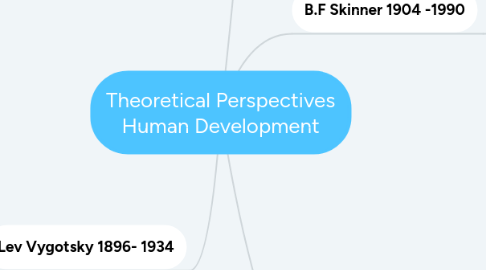Theoretical Perspectives Human Development
by Sarah Moreton


1. Lev Vygotsky 1896- 1934
1.1. Interactionist Theory
1.2. Primitive stage
1.3. Babies experiment with sounds. No verbal thought is taking place. Thoughts and speech sounds do not have a relationship at this stage
1.4. Naive Stage
1.5. Children speak words without comprehension of their purpose or meaning. Phrases lack grammar or structure. The infant gains meaning from responses given to their utterances.
1.6. External Stage
1.7. Children use objects to support meaning and words. Children will talk to themselves when alone and with others. they are beginning to verbalizing thought.
1.8. Ingrowth Stage
1.9. Children begin to internalize many tasks and thoughts. The need to communicate with others helps to strengthen these actions
2. Noam Chomsky 1928
2.1. Nativist Perspective
2.1.1. Universal Grammar
2.1.2. We are born with a set of rules about language in our minds. Which is referred to as " Universal Grammar"
2.1.3. Children don't just copy the language that they hear around them. They create rules from it, which they can then use to produce sentences. They do not rote learn a list of phrases and sayings, as the behaviorists believe, but a grammar that generates an infinite number of new sentences.
3. Jean Piaget 1896 -1980
3.1. Cognitive Development
3.2. Sensorimotor Birth - 2 years
3.3. Children hear and imitate sounds and begin to to understand the context to use them in.
3.4. Pre-Operational 2 - 6 years
3.5. Children are constantly talking often speaking their thoughts and actions. they display no awareness that others have a point of view.
3.6. Concrete Operational 7 - 11 years
3.7. Children are capable of logic and solving problems using factual stories. Children use specific and concrete facts rather than mental concepts.
3.8. Formal operational 11- adult
3.9. people use abstract reasoning . They are able to make mental distinctions between themselves and the idea they are considering.
4. B.F Skinner 1904 -1990
4.1. Operational Conditioning
4.1.1. When a child babbles they are rewarded by parent reactions. These reactions are seen as rewards, which encourage further articulation. Over time children learn and imitate sounds heard around them. These are all strengthened by repetitions, corrections and reactions by adults.

